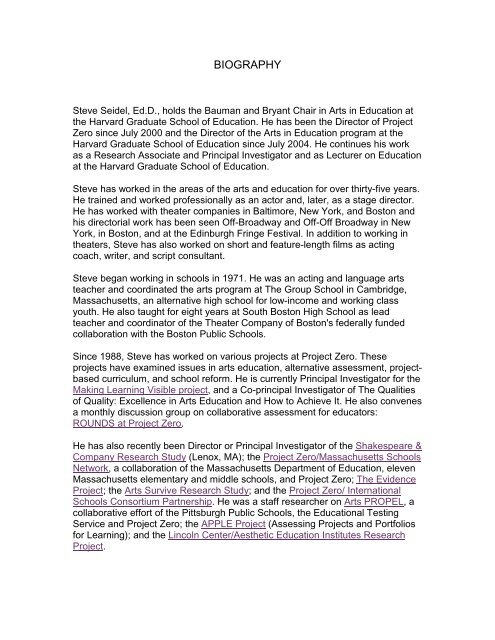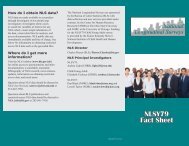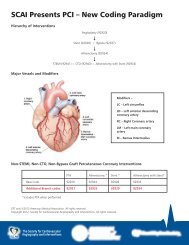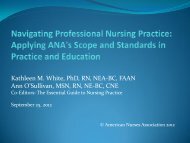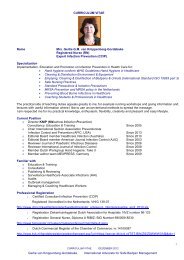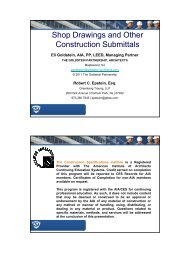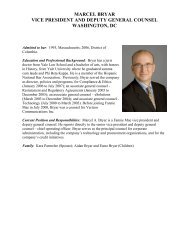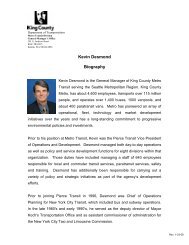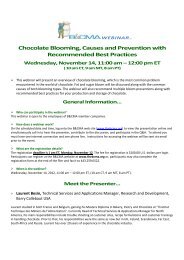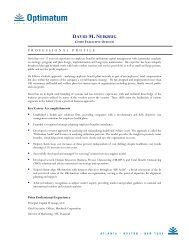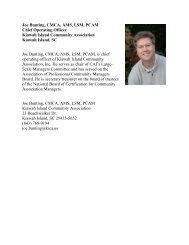Steve Seidel - CommPartners
Steve Seidel - CommPartners
Steve Seidel - CommPartners
You also want an ePaper? Increase the reach of your titles
YUMPU automatically turns print PDFs into web optimized ePapers that Google loves.
BIOGRAPHY<br />
<strong>Steve</strong> <strong>Seidel</strong>, Ed.D., holds the Bauman and Bryant Chair in Arts in Education at<br />
the Harvard Graduate School of Education. He has been the Director of Project<br />
Zero since July 2000 and the Director of the Arts in Education program at the<br />
Harvard Graduate School of Education since July 2004. He continues his work<br />
as a Research Associate and Principal Investigator and as Lecturer on Education<br />
at the Harvard Graduate School of Education.<br />
<strong>Steve</strong> has worked in the areas of the arts and education for over thirty-five years.<br />
He trained and worked professionally as an actor and, later, as a stage director.<br />
He has worked with theater companies in Baltimore, New York, and Boston and<br />
his directorial work has been seen Off-Broadway and Off-Off Broadway in New<br />
York, in Boston, and at the Edinburgh Fringe Festival. In addition to working in<br />
theaters, <strong>Steve</strong> has also worked on short and feature-length films as acting<br />
coach, writer, and script consultant.<br />
<strong>Steve</strong> began working in schools in 1971. He was an acting and language arts<br />
teacher and coordinated the arts program at The Group School in Cambridge,<br />
Massachusetts, an alternative high school for low-income and working class<br />
youth. He also taught for eight years at South Boston High School as lead<br />
teacher and coordinator of the Theater Company of Boston's federally funded<br />
collaboration with the Boston Public Schools.<br />
Since 1988, <strong>Steve</strong> has worked on various projects at Project Zero. These<br />
projects have examined issues in arts education, alternative assessment, projectbased<br />
curriculum, and school reform. He is currently Principal Investigator for the<br />
Making Learning Visible project, and a Co-principal Investigator of The Qualities<br />
of Quality: Excellence in Arts Education and How to Achieve It. He also convenes<br />
a monthly discussion group on collaborative assessment for educators:<br />
ROUNDS at Project Zero.<br />
He has also recently been Director or Principal Investigator of the Shakespeare &<br />
Company Research Study (Lenox, MA); the Project Zero/Massachusetts Schools<br />
Network, a collaboration of the Massachusetts Department of Education, eleven<br />
Massachusetts elementary and middle schools, and Project Zero; The Evidence<br />
Project; the Arts Survive Research Study; and the Project Zero/ International<br />
Schools Consortium Partnership. He was a staff researcher on Arts PROPEL, a<br />
collaborative effort of the Pittsburgh Public Schools, the Educational Testing<br />
Service and Project Zero; the APPLE Project (Assessing Projects and Portfolios<br />
for Learning); and the Lincoln Center/Aesthetic Education Institutes Research<br />
Project.
In addition to his research, <strong>Steve</strong> has worked as a consultant and evaluator to<br />
numerous arts and education organizations, such as the Performing Arts<br />
Program for Youth in Atlanta, GA, and the administrative team of the Danvers<br />
(MA) Public Schools.<br />
<strong>Steve</strong> is co-author of the 1997 NEA publication, Portfolio Practices: Thinking<br />
through the Assessment of Children's Work (with Joseph Walters and others), as<br />
well as Making Learning Visible: Children as Individual and Group Learners<br />
(Reggio Children), and Teaching as Inquiry: Asking Hard Questions to Improve<br />
Practice and Student Achievement (Teachers College Press).<br />
In addition, he has authored several published articles and chapters, including<br />
"Wondering To Be Done," in Assessing Student Learning: From Grading to<br />
Understanding (David Allen, Ed., New York: Teachers College Press, 1998) and<br />
"Learning from Looking," in With Portfolio in Hand: Validating the New Teacher<br />
Professionalism (Nona Lyons, Ed., New York: Teachers College Press, 1998)<br />
and was co-author of a study of applications of Multiple Intelligences theory to<br />
classroom practice, "Minds at Work: Applying Multiple Intelligences in the<br />
Classroom," with Mara Krechevsky, in Intelligence, Instruction, and Assessment<br />
(Sternberg and Williams, Eds., Mahwah, NJ: Lawrence Erlbaum Associates, Inc.,<br />
1998). He is contributing author in the chapter, "Children as Reflective<br />
Practitioners: Bringing Metacognition to the Classroom" (with Joseph Walters and<br />
Howard Gardner), in Creating Powerful Thinking in Teachers and Students:<br />
Diverse Perspectives (Mangieri and Block, Eds., Fort Worth, TX: Harcourt Brace,<br />
1994). He is also the author of "Stand and Unfold Yourself: A Monograph on the<br />
Shakespeare & Company Research Study," published in Champions of Change:<br />
The Impact of the Arts on Learning (Arts Education Partnership and the<br />
President's Committee on the Arts and Humanities).


